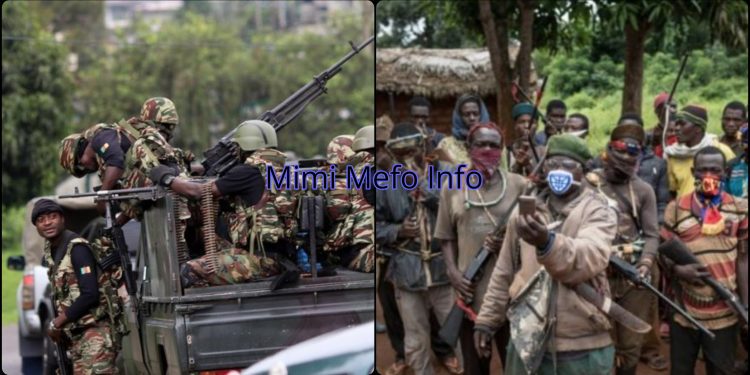The Cameroon Anglophone Crisis Database of Atrocities has released a new report documenting several atrocities Cameroonian security forces and Ambazonia separatist fighters committed against civilians between September 2022 and May 2023.
The database, compiled by a team of impartial and independent researchers and civil society leaders, records at least eight abuses, including arbitrary arrests and detention, torture, burning of schools, churches, and private homes, abductions, and explosive attacks on civilians.
The report was released on September 21, coinciding with the International Day of Peace. The researchers said they used geolocation, based on videos, photos, satellite imagery, eyewitness accounts, social media posts, and news items, to compile the detailed report.
The report implicates Cameroon’s security and defence forces in at least two instances. This includes the arbitrary arrest of at least 42 youths at Matoh village in Meme Division on March 2, 2023.
“Although a government official claimed those arrested would be detained for no longer than 15 days, researchers have found no evidence of their release,” the database stated.
It also revisits abuses meted out to civilians by Buea-based BIR officer, Ewume John, aka Moja Moja. He has been implicated for harassing unarmed civilians, through beating, forced head shaving, threats of violence, and public humiliation between 2020 and 2022.
Separatist Fighters Primarily Targeting Civilians
Ambazonia separatists have been called out for committing the worst abuses against civilians across the North West and South West Regions during the last few months.
They have been accused of burning Government Bilingual High School (GBHS) Eyumojock, in Manyu Division, on November 18-19, 2022.
Although separatists did not claim responsibility for the attack, they were the main suspects behind the burning.
“Although no perpetrator is visible, online sources alleged separatist fighters are responsible. This would be consistent with previous attacks on education by separatist groups,” the database noted.
This was an isolated case of several schools that Ambazonia separatists have torched as part of their campaign against school resumption in the North West and South West.
In June this year, Reliefweb reported that education was in crisis in the two English-speaking Regions, with 2, 245 schools still non-functional. It also reported that just 39 percent of schools were functional in the South West and 68 percent in the North West.
The database report also documents the destruction of Churches and residential buildings in the two regions during the last few months.
Still in Manyu Division, the database implicates separatist fighters for abducting Christians and for burning St Mary’s Church in Nchang village on September 16, 2022.
In the North West Region, separatist fighters burned the mayor’s house in Wum, Menchum Division, on October 17, 2022, and some trucks carrying foodstuffs in Ngoketunjia Division on February 3-4, 2023.
“Sources identified separatist fighters as responsible for the truck burnings and the Cameroon military as responsible for the village burning,” the database said.
In one of the several attacks they carried out this year, the separatists detonated three explosive devices that killed a woman and injured about 19 people, including athletes, during the Mount Cameroon Race on February 25.
Over the last few weeks, there have been numerous attacks on civilians by the separatists, resulting in significant loss of lives.
Far From Over
The attacks came at a time when many English-speaking Cameroonians thought the armed conflict was fading off after over six years of killing and destruction.
But recent developments tell a different story.
“These data reports confirm that six years on, deaths and destruction are still a regular occurrence in the Anglophone conflict zones,” says Dr. Christopher Fomunyoh, Senior Associate and Regional Director for Africa at the National Democratic Institute in Washington, D.C.
He reacted to the database after it was released. “The vicious cycle of violence and retaliation with impunity continues to foster suffering and deprivation, especially among civilian populations,” Dr. Fomunyoh added.
Separatist atrocities on civilians have doubled in the last two weeks after they called for a two-week lockdown that presumably targeted school resumption in the Anglophone Regions.
At least nine civilians died during and after the weeks of lockdown and their deaths were directly blamed on separatists. The most recent is the killing of four plantation workers at Pamol Plc in Ndian Division on September 18.
This week, soldiers killed one of the lead separatist commanders in Meme Division popularly called “FM Bitter Kola” alongside four other fighters. But several other self-proclaimed commanders remain littered in the English-speaking Regions.
Early this year, the Cameroonian government shocked the national and international community when it backed out of a Canadian Government mediation initiative aimed at resolving the conflict.
The Database
The University of Toronto hosts the volunteer initiative called the Database of Atrocities which has presented the findings for this report. This initiative is dedicated to collecting and verifying information about the atrocities taking place in the Anglophone conflict in Cameroon.
The main objectives of this initiative are to address impunity, discourage future acts of violence, and preserve information for potential international justice proceedings and the establishment of a national truth, justice, and reconciliation commission. To date, the Database has received and retrieved more than 1500 submissions.
The team investigates submitted incidents and produces verification reports whenever the level of evidence allows. The Database team consists of volunteer researchers from various institutions, namely the Edinburgh International Justice Initiative, the University of Exeter, Leiden University, and the University of Toronto. Their efforts are supported by CHRDA.
The database has been consistent in documenting atrocities in the ongoing conflict in Cameroon’s English-speaking regions. More of their reports can be found here.
The Database is dedicated to securely storing information pertaining to human rights abuses. If you have videos, photos, or documents related to the atrocities committed during Cameroon’s Anglophone Crisis, you can upload them anonymously and securely at the following link.



